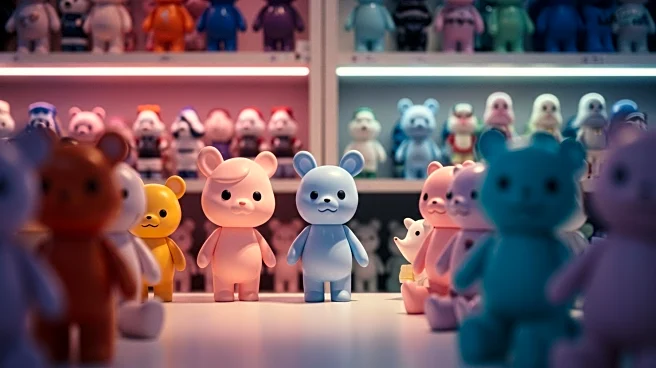What's Happening?
Pop Mart, a Beijing-based toy company, is experiencing a surge in popularity for its Labubu dolls, with revenue in the Americas increasing by over 1,000% year-on-year. However, the company is facing challenges due to the rise of counterfeit versions known as 'Lafufus.' These fakes are being sold at lower prices, attracting consumers who are unable to purchase the authentic dolls due to shortages and high costs. Pop Mart has taken legal action against retailers selling counterfeit products and is working to increase production to meet demand. Despite the popularity of the fakes, Pop Mart's unique marketing strategy, including the 'blind box' approach, continues to attract a dedicated fan base.
Why It's Important?
The situation highlights the challenges faced by companies in protecting their intellectual property and maintaining brand integrity in the face of counterfeit products. For Pop Mart, the proliferation of fake Labubu dolls could impact its revenue and brand reputation. The company's ability to address these issues will be crucial in sustaining its growth and expanding its market presence, particularly in the U.S. and other international markets. The case also underscores the broader issue of counterfeit goods in the global market, which can pose safety risks to consumers and financial losses to legitimate businesses.
What's Next?
Pop Mart is expected to continue its legal efforts against counterfeiters and may increase production to reduce shortages of authentic Labubu dolls. The company is also planning to release a new, smaller version of the Labubu doll, which could help maintain consumer interest and drive sales. As Pop Mart expands its global footprint, it will need to navigate the complexities of international intellectual property laws and consumer preferences to sustain its growth trajectory.
Beyond the Headlines
The rise of counterfeit Labubu dolls reflects a broader trend of consumers seeking affordable alternatives to high-demand products. This trend is facilitated by social media, which has reduced the stigma associated with owning knock-off items. The situation also raises questions about the effectiveness of current intellectual property enforcement mechanisms and the role of consumer education in combating counterfeit goods.









